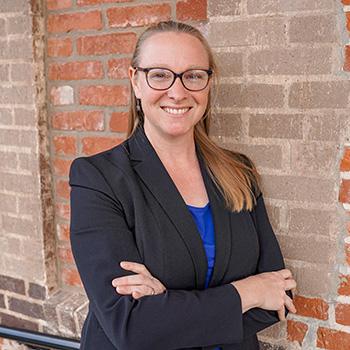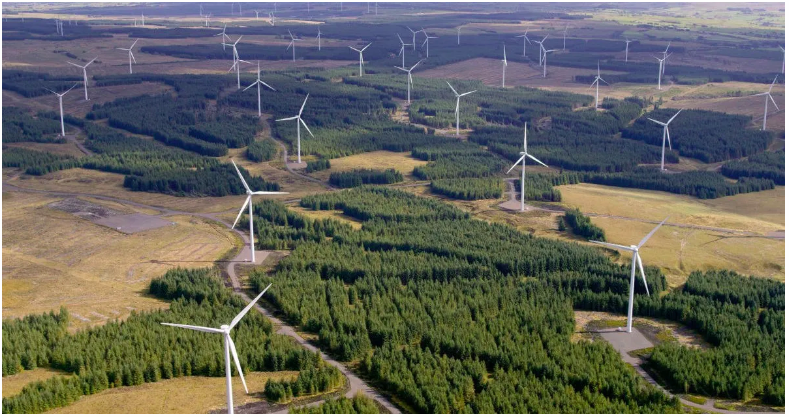LAWRENCE – Douglas County Commissioners on Wednesday are expected to consider new wind farm regulations which industry officials have said will freeze out any chance of a turbine field construction in Douglas County, but opponents are still dubious particularly since they say a county commissioner has explored a business relationship with the developer.
Members of the Douglas County Rural Preservation Association have charged that commissioner Karen Willey, who was previously on the Douglas County Planning Commission during early discussions about the regulations change, should recuse herself from any vote undertaken on Wednesday’s consideration of the new regs because they say she has a possible financial interest in a 90-turbine project proposed for southern Douglas County.

Willey, speaking via Douglas County’s public information officer, said she declined an offer from NextEra to place wind measurement equipment on her property, and that she’ll give due consideration to all sides in assessing the county planning commission’s proposed revisions to the wind regulations.
Opponents cite a copy of a March 29, 2022, email between City of Lawrence planning department staff member Sandra Day and planning department director Jeff Crick that details Day’s concerns about Willey’s position in the debate. Willey at the time served on the planning commission, before her August 2022 appointment to fill the 3rd District Douglas County Commission post.
“I spoke with Tonya yester(day) afternoon about the NextEra interest,” Day’s email reads. “She mentioned that Karen Willey is looking at a contract for NextEra to place some testing equipment (SODAR)on her property. Karen had also exchanged some email with me last week about the SODAR interest. Tonya questioned the appropriateness of Karen being on the commission and considering the text Amendment while she is also considering a lease with NextEra.”
“Karen did say that she was likely to wait until she is off the commission before she considers the lease further. This seems awful close to the line and something that Karen might want to disclose if we bring this back before her term concludes,” Day wrote.
Douglas County Public Information Officer Karrey Britt told the Informer Willey had no conflict of interest and that she fully intended to participate in the decision.

“In 2022, before Commissioner Willey began her service on the County Commission, she and her husband — like many others in the area — were approached by NextEra about a potential lease for wind turbines on their property” Britt told the Informer. “They declined this offer. NextEra also asked if they would be willing to put a SODAR data-gathering unit on their property. Commissioner Willey and her husband declined this offer, as well, and did not sign a contract with NextEra. To this day, they do not have a contract with NextEra, or any other alternative energy developer.” She said the Willeys expect to have no compensation from a future wind or solar project.”
Willey said through Britt she was reserving judgment on the regs until all sides had been heard.
“I am keeping an open mind about the proposed text amendments. I will listen carefully to the staff reports and public comments offered during the hearing. I will reserve final judgment on the proposed amendments until the Commission is able to receive that information and publicly discuss the issues,” Willey’s statement read.
DCRPA head Mike Forth told the Informer in January NextEra’s protests over the proposed new regs were crocodile tears aimed at keeping tighter restrictions from being enacted.

“The new setback requirements do not prevent a commercial wind project,” Forth said after the recommendation earlier this year– “it requires more effort and better planning.” He said the county’s population density, even in the rural areas, makes it not suitable for large scale commercial wind generation.
“Our population density is around 33 people per square mile and a sizable number of those residents live on small acreage land plots of less than 40 acres,” Forth said. “The setbacks are designed to protect landowners, and what NextEra wants fails to provide adequate protection from ice throw, turbine failure, blade failure, fire, noise, etc.”
The thrust of the new regulations is an increase in turbine setbacks from private property that increase from an original 1,500 feet to 2,500 feet – a move NextEra attorney Alan Claus Anderson told the Lawrence Journal World after a January planning commission meeting would prevent any developer from ever seeking a project in the county.
Forty-four of the federal tax credit subsidy dependent projects now pockmark Kansas, in each case turning rural areas into battlegrounds and pitting financially hard-pressed farmers hoping to generate revenue from their land against neighbors who resent the vast aesthetic and other impacts of a massive power plant stretching over tens of thousands of nearby acres.
Though frequently criticized by opponents for their inability to produce consistent electricity comparable to conventional natural gas, coal and nuclear power plants, the lucrative attraction of federal tax credits and continual favor by the green energy lobby which dominates the Environmental Protection Agency has continued the pursuit of wind and solar projects across the Midwest.
Wednesday’s Douglas County Commission meeting begins at 5:30 at the Public Works/Zoning and Codes Building, 3755 E. 25th St., in the training room. The meeting will also be available by Zoom. For the Zoom link and meeting information, click here.
Dane Hicks is a graduate of the University of Missouri School of Journalism and the United States Marine Corps Officer Candidate School at Quantico, VA. He is the author of novels "The Skinning Tree" and "A Whisper For Help." As publisher of the Anderson County Review in Garnett, KS., he is a recipient of the Kansas Press Association's Boyd Community Service Award as well as more than 60 awards for excellence in news, editorial and photography.





